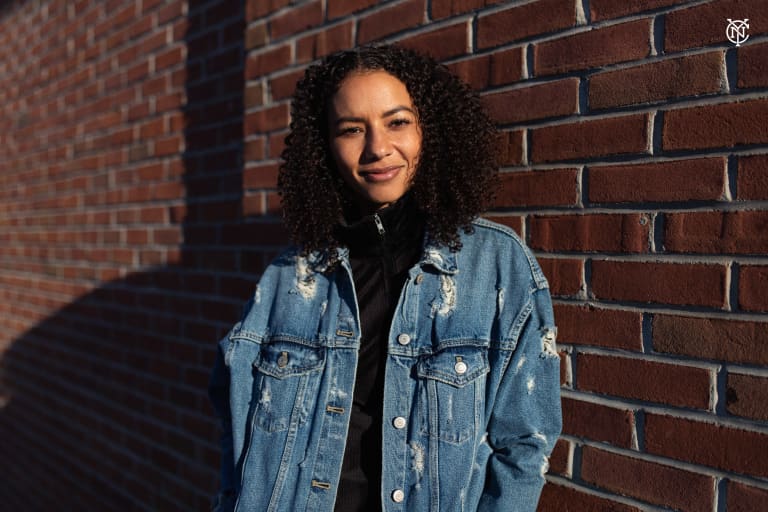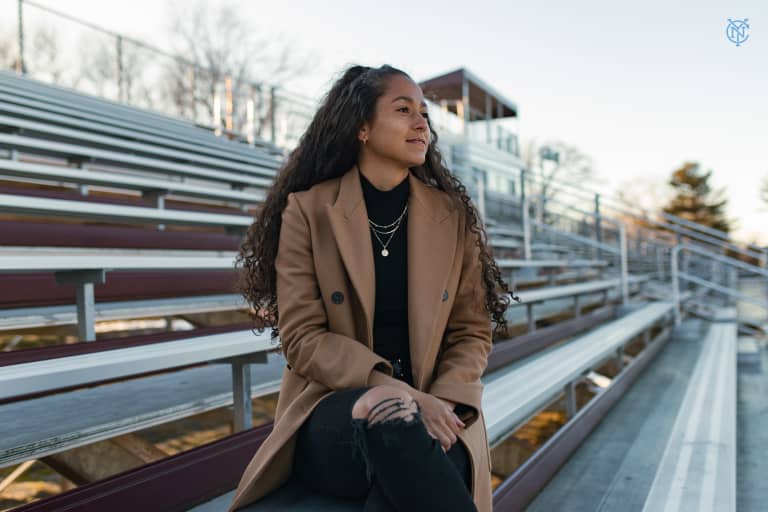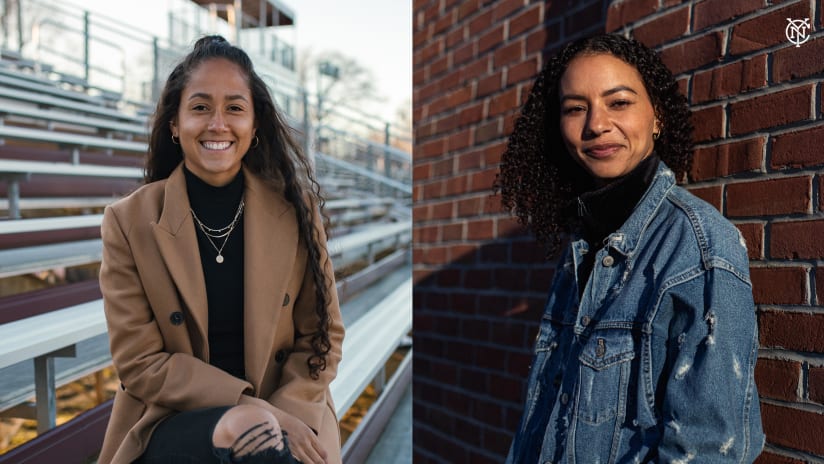NJ/NY Gotham FC players Estelle Johnson and Domi Richardson joined NYCFC.com for a conversation about the formation of the Black Women’s Player Collective, who inspired them as young, aspiring athletes, and their hopes for this upcoming year as they kick off this season on April 14th against the Orlando Pride in the 2021 NWSL Challenge Cup.
Katie Cahalin: How are you guys feeling? How has your preseason been going?
Domi Richardson: I think right now I'm feeling good. We’re here earlier than normal, so getting used to the cold as a Californian is something hard to do. But you know, we're good. The first month has been good so far.
Estelle Johnson: It’s a longer preseason this year so it's a little bizarre. We're used to playing after a month or six weeks of preseason. So, having that double is a little bit different but giving us more time to prepare so we’re feeling good about it.
KC: Domi, what part of California are you from? How long have you been playing soccer?
DR: I am from Orange County, so Southern California by Disneyland. I started playing soccer at four years old. I'm 28 now so it's been a long, long soccer journey for me. I played basketball a little bit too until my senior year of high school so that was fun as a dual sport athlete. I didn't get drafted. I went to open tryouts and I'm still playing eight years later in the league. It's been quite the journey for me, but it's been good.
KC: Estelle, you retired at one point and then came back to the game. What has your journey been like?
EJ: I played in the WPS back when that was the league and, in my offseason, I was taking classes at a school in Kansas City. I got really close to finishing my masters, so I decided I was done playing soccer and ready to join the real world. That lasted about a year and then I decided soccer was real world for me.

KC: Lately, we’re seeing a heightened interest in women’s sports and especially women’s soccer. How does this growing interest inspire or excite you?
EJ: It's been just a steady progression. Obviously now, like, as you mentioned, women's sports are starting to blow up and we're starting to get some recognition as professional athletes. We do all the things that the men do so it's only fair that we get the same recognition. I think that I was kind of spoiled growing up and watching the Abby Wambach's or the Heather Mitts’ and I was then able to play with those players. I feel like I'm in that middle area where that generation really started it and we're just trying to keep the momentum and pass it on to Domi and all my younger teammates to carry on.
DR: My first year in the league, I used to make a joke with one of my teammates, like, ‘oh, we're just the trailblazers, or we're blazing the trail for the people behind us.’ I'm younger than Estelle, so that's what she did for me. I think, just like she said, paying it forward to the younger generations and dealing with things and working through things that hopefully they won't have to work through in the future because we did it for them and the people before us did it for us.
KC: Who were some of the people you looked up to as a young athlete?
EJ: For me, it was Briana Scurry and Shannon Boxx. That generation of players, I think, was the first time that we were really seeing Black women on a global scale representing the U.S. and doing it well. Doing it professionally. I distinctly remember growing up my dad forced me to come home early. He’d be like, “The games at three you have to be here at 2:30.” Because Bri was in goal. I didn't really realize what type of impact that was going to have on me until a little bit later when I realized I never felt like I didn't belong because I was able to watch the Briana Scurry’s and the Shannon Boxx’s do all of that for me.
KC: Do you think your dad recognized the importance of that representation from the jump?
EJ: Totally. I actually asked him that just a couple weeks ago about if he had any motivation around that. He was just like, “Absolutely. I didn't want to force you to do anything he didn't want to do but I wanted to make sure that you saw if this was what you wanted to do it is totally possible.”
DR: I think it was the same thing for me. Seeing Shannon Boxx, Briana Scurry. I don't have a lot of very distinct memories from childhood, but I distinctly remember seeing them on the TV. I don't think at the time I thought “Oh, they look like me.” I think as I grew up, I then realized that's why maybe I was more attracted to watching them is because they looked like me and I didn't see anybody else that looked like me. But I do remember, when I think I was seven or eight there's a picture of me like squatting down to the soccer ball on picture day and next to it I wrote, “I'm coming for you, Mia Hamm.” Why did I write that? I don't know. There wasn’t even a women's professional league at the time. But I was seven years old and I knew I wanted to play.
KC: As those players who came before you have, you’re both paving the way now in such an important way as two members of the Black Women's Player Collective (BWPC), a nonprofit organization formed by the 40+ Black women competing in the NWSL. How did the BWPC come to be and why it was so important to establish?
EJ: I'm not quite sure how it even started to be honest. But I know that as the Black Lives Matter movement became bigger and bigger and closer to the forefront and it was starting to affect us more and more on the daily, we wanted a place that we could talk to people who understood us. I think it started with a group chat and people just kept getting added in. We decided that this is something that's important to us, it empowers us and we should make it more official. From my understanding, it started super organically around just wanting to surround ourselves with other players who are going through the same thing that we are.
DR: I think at the end of the day, representation is super important. I grew up in California and it is a melting pot, but soccer specifically, I did not have a lot of Black teammates. For most of the time I played soccer, the only other Black teammate that I had was my sister. Now this year, we have seven Black women on our team. I remember last year in one of our games, I looked around at the starting lineup, and we're all on the field together, and I’m like, this is the first time this has ever happened in my life. For things like that, it's super important to have a group that we can kind of come back to and just share our stories. We all level on the same playing field with things that other people haven't experienced.

KC: What do you hope to accomplish with the BWPC?
EJ: I think the endgame is that we reach a place where we don’t need to have one of these committees. In the meantime, I think the goal is to have a voice.
DR: I totally agree. It's important to lift up the people around us. Especially for us, our voices have kind of been dimmed and put on the back burner for a while. Having this group allows for other people to see things from a different perspective that maybe they wouldn’t have sought out themselves.
KC: Do you feel you have a certain responsibility as athletes to use your platforms for social change?
EJ: Yes and no. The athletes that probably feel the most pressure are the Crystal Dunn’s and the athletes that have a gazillion followers, and those followers expect things from them. For me, I don't have that level of a following so I don't really feel pressured to make statements or whatever so I can't really relate to that kind of pressure. I do feel a sense of responsibility as a professional athlete to be able to touch the few people that do follow me and people who do want to hear what I have to say. That’s a responsibility that I put on myself.
DR: We as kids looked up to athletes, so I think it’s just natural to feel that responsibility. For me, I don’t really feel that much pressure, I think, because the things that I do speak up about are things that I care about.
KC: After a difficult 2021, what are you looking forward to this year it be on the field or off the field?
EJ: I'm looking forward to finding some sort of normalcy, whatever it is. I just feel like 2020 was a lot of trying to figure out what we can do and what we can't do COVID wise. I'm hoping that we figured out most of that, so now we can just focus on trying to get back to like our normal routines. For athletes, we're very routine-oriented people so that's an important thing. So, yeah I'm just looking forward to some normalcy.
DR: I think being in the [NWSL Challenge Cup] bubble, we had a lot of conversations as a team about some really good things and really important things. I think in the summertime specifically, the whole world was feeling kind of what Black people have felt for a long time and kind of dealing with that ache and that pain of how we move forward from a George Floyd or something to that extent, but I think this year it's just important that we know that there is hope for the future that because now we're all starting to feel that way or starting to realize that it's happening. There's hope that we can get better because we're all on the same page now. It's not getting pushed under the rug. It's not, not getting talked about. So yeah, I think with that, social justice, COVID, getting back to our normal season, it’s just looking to progress in the future.
KC: Do you have any bit of advice you would give your younger self or a young athlete?
EJ: My biggest piece of wisdom and something that I always lived by is you know who you are. Figure that out quickly and stick to your guns. Figure out the things that matter the most to you, be strong in those things, and let everything else fall where they may.
DR: Something that's gotten me this far is just having a sense of unshakable confidence. Even when you're feeling bad, you know that you're going to make it through to the next practice, the next month, the next game. Not letting other people control that for you is really important. Also, just perfect what you're really good at. Obviously work on your weaknesses but get something that you're really good at and get even better at it. I think that's what takes you to the next level.
ABOUT NJ/NY GOTHAM FC
Based in New Jersey, Gotham FC plays its National Women’s Soccer League home matches at Red Bull Arena in Harrison, NJ. The Club has been part of the NWSL since its inception in 2012. Sky Blue FC was originally founded in 2007 when it made its debut as Jersey Sky Blue in the W-League of United Soccer Leagues. The Club won its first trophy in 2009 after winning the inaugural Women’s Professional Soccer championship. Most recently, the Club won its first NWSL playoff match since 2013 during the 2020 NWSL Challenge Cup. In April of 2021 Sky Blue FC made a dramatic shift with a new brand identity becoming NJ/NY Gotham FC. The name, logo and colors were selected after extensive fan involvement and will guide the club into the future with bold international ambitions.
ABOUT BLACK WOMEN’S PLAYER COLLECTIVE
The Black Women’s Player Collective (BWPC) is a nonprofit organization that elevates the image, value, and representation of Black women as athletes and leaders in business, industry, and public and private institutions. The BWPC currently consists of the 43 Black women competing in the NWSL as of 2020 and aims to provide a collective voice to the Black perspective and experience of a professional female athlete amidst the incessant and pervasive racial inequality and social injustice plaguing our country. Follow BWPC on Twitter and Instagram.








